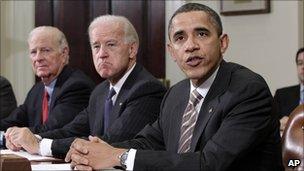Obama: Start nuclear treaty vital for national security
- Published

Barack Obama said every president since Ronald Reagan had been able to pass similar pacts
US President Barack Obama has called the ratification of a new nuclear arms treaty with Russia "a national security imperative", adding that the US Senate must act before a new Congress arrives.
The treaty would reduce both countries' nuclear arsenals and allow each to inspect the other's facilities.
Mr Obama has expressed confidence the measure will pass successfully.
But some Republicans have resisted the administration's push, saying it should not be voted on this year.
Senate Republicans have also claimed they need further reassurance about America's nuclear deterrent capability after Start.
The president's announcement came one day after Secretary of State Hillary Clinton pressed Congress to ratify the treaty.
'National security priority'
In a move to influence current members of the US Senate, Mr Obama made the announcement about the New Strategic Arms Reduction Treaty while surrounded by former secretaries of state and defence from both major political parties.
"There is no higher national security priority for the lame duck session of Congress," Mr Obama said, referring to the time between November's congressional elections and the January start of the new Congress.
"If we ratify this treaty, we're going to have a verification regime in place to track Russia's strategic nuclear weapons, including US inspectors on the ground," he added.
Mr Obama, who said that every president since Ronald Reagan had been able to get such pacts through, proclaimed that the US cannot risk losing Moscow's support on matters of international security, which include placing pressure on Iran over its pursuit of nuclear weapons.
Trust may not be enough between the US and Russia, said top State Department official Ellen Tauscher in an interview with BBC state department correspondent Kim Ghattas.
"No, not when you have something better like a treaty, which is legally binding," said Mrs Tauscher, adding that it is important for the world community to trust the two countries, which have 90% of the world's nuclear weapons.
The Obama administration needs eight Republican votes to reach the 67 needed to ratify the treaty - but that number will increase to 14 when the new Congress convenes in January, as the Republicans won more Senate seats in the mid-term elections.
But the president may continue to meet opposition from Senate Republicans.
A handful of Republicans have said they have outstanding concerns about the impact the treaty would have on America's nuclear deterrent capability. They've also called for a commitment from the Obama administration to fund the modernisation of the country's nuclear arsenal.
In a rare appearance at the US Capitol on Wednesday, Mrs Clinton spoke alongside Senate Foreign Relations Committee chairman John Kerry and Republican Senator Richard Lugar, also urging the Senate to ratify the treaty in response to a "continuing threat that is posed to our country".
- Published17 November 2010